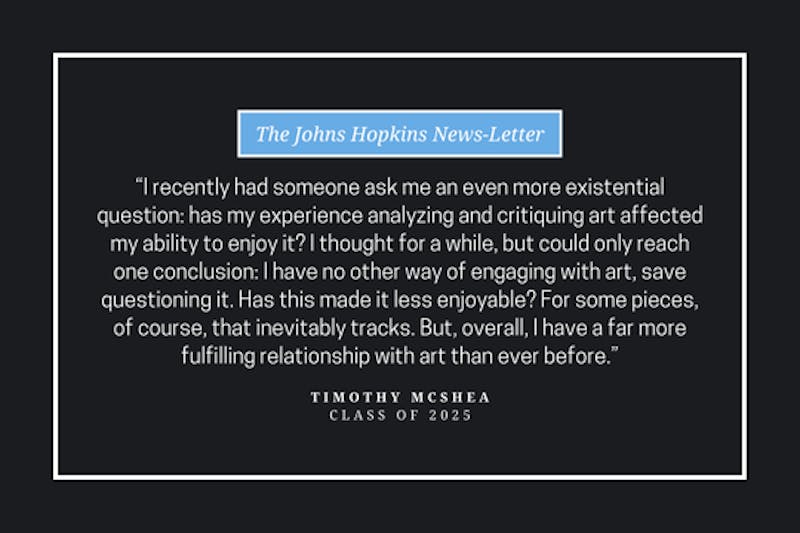

As a two-year editor for the Arts and Entertainment section of The News-Letter, I’ve received some flack for my approach to art criticism, especially in my coverage of Hopkins events. Though rarely said to my face, I’ve heard that my articles haven’t always been received well by certain student artists. I suppose this shouldn’t come as a surprise — one shouldn’t dish out what they can’t take — but it’s hard not to be reflective when I hear about it. It’s hard not to ask: Why did I even decide to publicly critique Hopkins art in the first place?
I recently had someone ask me an even more existential question: has my experience analyzing and critiquing art affected my ability to enjoy it? I thought for a while, but could only reach one conclusion: I have no other way of engaging with art, save questioning it. Has this made it less enjoyable? For some pieces, of course, that inevitably tracks. But, overall, I have a far more fulfilling relationship with art than ever before.
I’m not interested in telling people to publish every opinion they have. Full transparency: I’ve never done that. At least, I’ve tried not to. I don’t think negativity and cynicism get anybody anywhere, and I certainly don’t subscribe to the type of criticism that berates performers with unnecessary insults and epithets. Former American talk show host Conan O’Brien has been quite open about his struggles with harsh critics during the first year of his first show, Late Night with Conan O'Brien. One particular early review by television critic Tom Shales insulted his nervous tics and his rabbit-like, “beady little eyes.” O’Brien claims to have been so torn up by the review that he curled up under his office desk in shame. If my reviews ever created this level of embarrassment, then I would feel I had failed to elevate the art forms I love, did a disservice to the art and the artist.
But I also never thought my critical articles could enact any specific change, either. I think some reacted under the false assumption that I consciously wrote my articles hoping that the artist(s) would listen, that they would alter their style to match my desires. In truth, I never wrote with the artists in mind at all. My intended audience was hazy, probably just a person interested in the artistic mediums I discussed.
So no, criticism is not about creating immediate change. Change like that would be harmful, attempting to push artists out of a career, or companies into bankruptcy. The purpose of criticism is much more abstract than that. When you critique someone’s work to your friends or family, do you want to ruin their life? Of course not, because these are opinions, not diatribes. But then, why is it important to share them at all? Why not keep your opinions to yourself?
In many ways, the importance of criticism can only be defined by its opposite; imagine a world where negative opinions of art were always discussed in private, where social convention necessitated a fabricated positivity about everything artistic. Imagine how stifling and toxic a community would feel if all performances were lauded and praised in public, but criticized and ridiculed in private? How would you feel as the audience? How would you feel as the artist? In a world of false positivity, there are no good options; you’d either feel silenced, false and inauthentic, or uneasy, suspicious and alone.
Art as an absolute good is a false concept. People understand this implicitly — art is subjective, right? But there has been a recent trend in artistic circles where art’s implicit subjectivity has been used to silence people. The phrase “let people enjoy things,” for example, is immensely ironic. It simultaneously encourages opinions and discourages people from expressing them. Let people enjoy things, yes, but also let people express themselves when they don’t enjoy the same things as you.
I get most spirited in my discussions of art when I feel that I have a firm opinion about it. Many react to this with silent confusion, even bewilderment. But, sometimes, I wish I could tell them that I’m not defending my opinion for the sake of winning. I’m defending it in the hopes that someone will show me another perspective that I could never have thought of on my own. I’m defending it because it helps me understand my own relationship with art in a deeper way. And, yes, I’m defending it because I consider myself an aspiring artist, and I want to know as much about art as possible.
My time at The News-Letter has emboldened me to not only be a better critic of others but also be a better critic of myself. It has improved my own creative endeavors more than any other organization I’ve ever been a part of, and that includes my Writing Seminars courses and extracurricular workshops (though these were also priceless experiences). Receiving the untethered freedom to research art history, to thoughtfully discuss the arts at Hopkins and my own biased preferences with the most unique and brilliant staff imaginable has been the experience of a lifetime. It's why I’m so passionately inquiring that you find the same space to be critical.
So, the next time you’re not feeling a movie that your friends enjoy or an album that they listen to constantly, don’t be afraid to critique it. Of course, you never want to ruin the mood, but, if you can take ownership of your opinion, then perhaps your friends will reconsider their own. If they don't, that's okay. But both you and your friends will have a better understanding of art and of each other.
Timothy McShea is from Ellicott City, Md., and is graduating with a degree in English and Writing Seminars. He is a former Arts and Entertainment Editor and Sports Editor for The News-Letter.